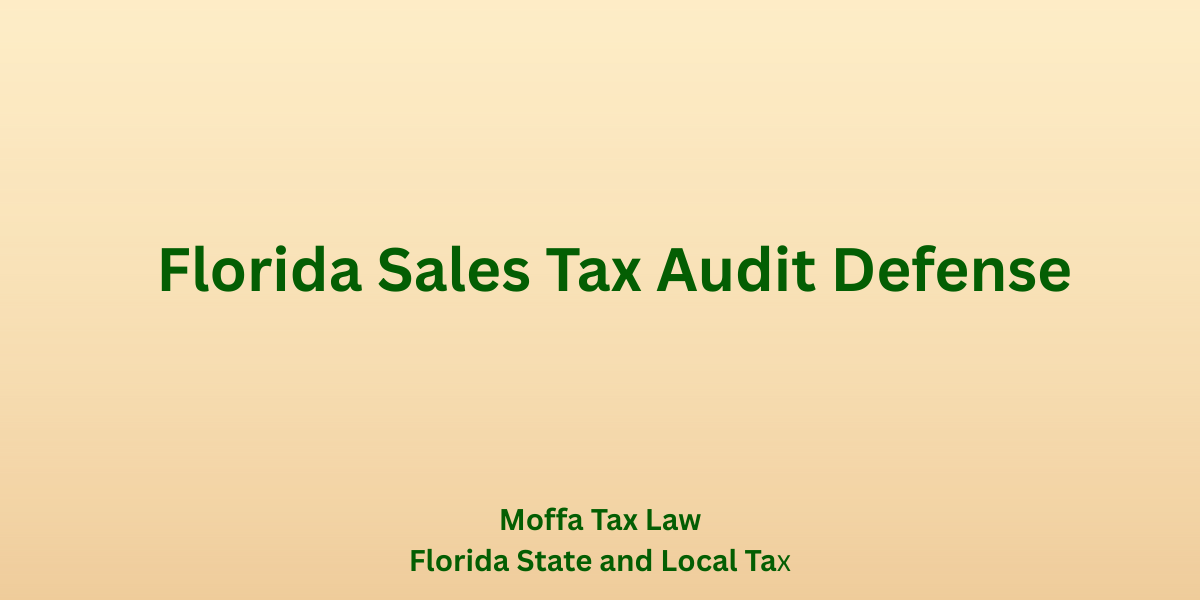NEWS & INSIGHTS


Florida Sales Tax Audit Defense: A Comprehensive Guide for Businesses and Professionals
Introduction
In Florida, sales tax audits are more than just routine financial reviews—they’re often aggressive, high-stakes investigations that can lead to significant tax assessments, penalties, and even criminal exposure. If your business receives a Notice of Intent to Audit from the Florida Department of Revenue (DOR), you need to understand your rights and how to build an effective Florida sales tax audit defense. This guide is designed to walk business owners, CPAs, and tax attorneys through every stage of a Florida sales tax audit, from first notice to final resolution. For those unfamiliar with the process, or for those looking to deepen their understanding, this guide provides detailed, step-by-step insights into the complexities of Florida sales tax audit defense.
Understanding the Florida Sales Tax Audit Process
The Florida Department of Revenue initiates sales tax audits to verify compliance with Chapter 212, Florida Statutes, which governs the imposition and administration of sales and use tax. Audits may be triggered by late filings, irregular reporting patterns, tips from whistleblowers, data anomalies, industry-specific audit programs, or even random selection through internal algorithms designed to detect noncompliance.
Once selected for audit, the business receives a DR-840 Notice of Intent to Audit Books and Records. This document marks the official beginning of the Florida sales tax audit process and initiates a formal review of the business’s financial records. The Department will request access to a wide array of materials, including but not limited to sales records, purchase records, general ledgers, bank statements, point-of-sale (POS) system reports, invoices, and exemption certificates. The scope of the audit often extends several years into the past and is not limited solely to sales tax issues—it may also encompass use tax and other related liabilities.
A critical feature of Florida sales tax audits is the Department’s reliance on sampling and projection methodologies. If errors are identified in a small sample of transactions, those errors are extrapolated across the entire audit period. For example, if the auditor finds a recurring issue in January 2022, that issue may be projected to apply to every other month in the audit scope, potentially leading to massive assessments. As such, a strong and strategic Florida sales tax audit defense is not merely beneficial—it is essential from the moment the audit begins.
The Phases of a Florida Sales Tax Audit
The Florida sales tax audit process can generally be divided into several distinct phases, each of which requires its own strategy and level of preparedness.
In the pre-audit planning phase, businesses should immediately consult with a Florida sales tax audit defense attorney. This step cannot be overstated. Legal counsel can help limit the scope of the audit, control the narrative presented to the auditor, and ensure that all submissions are accurate, complete, and legally framed. Furthermore, the attorney-client privilege protects communications and strategic decisions, which can be a significant safeguard during contentious audits.
The fieldwork phase involves active interaction with the Department’s auditors. Auditors will analyze records, conduct interviews, and request clarification on transactions. This is a critical phase, as many assessments are shaped during this time based on how data is presented and explained. Businesses should avoid casually volunteering information that isn’t requested and should focus on clarity and consistency in their responses. A well-prepared Florida sales tax audit defense team will anticipate auditor questions and provide contextual support that mitigates risk.
Following the fieldwork, the Department will issue a DR-1215, the Notice of Intent to Make Audit Changes. This document outlines the auditor’s preliminary findings, including proposed adjustments to taxable sales and estimated liabilities. The business now has an opportunity to respond, correct any factual errors, dispute legal conclusions, and provide additional documentation. A persuasive and timely response to the DR-1215 is a cornerstone of effective Florida sales tax audit defense. It often sets the stage for whether the Department adjusts its findings or moves forward to assessment.
If the Department maintains its proposed changes, it will issue a Notice of Proposed Assessment (NOPA). At this point, the stakes are high. The business must decide whether to accept the assessment, negotiate a settlement, or file a formal protest within 60 days to initiate an administrative appeal. The quality of the Florida sales tax audit defense during this phase can determine whether the case is resolved administratively or escalates to formal litigation.
Common Triggers for High Assessments
Numerous issues can lead to significant sales tax assessments. One of the most common involves exemption certificates. If a business claims a resale or other exemption without properly documenting it, the Department may disallow the exemption entirely and assess tax on all such transactions. Incomplete, expired, or misclassified certificates can cost businesses tens of thousands of dollars.
Another common problem lies in POS systems and Z-tapes. Inconsistent or missing Z-tapes, data not reconciling with bank deposits, or cash sales that aren’t adequately tracked can all be construed as underreporting. These issues often result in estimates and extrapolated assessments. The Department may assume that any inconsistencies indicate a systemic problem—and use that assumption to justify a sweeping assessment.
Misunderstandings of taxability can also lead to high liabilities. For example, businesses may incorrectly treat certain goods or services as exempt, when in fact they are taxable. Likewise, out-of-state purchases or vendor noncompliance may result in use tax liabilities that catch business owners by surprise. When documentation is weak or absent, the Department may rely on estimates that grossly overstate the liability, further underscoring the importance of a proactive Florida sales tax audit defense.
Building a Strategic Florida Sales Tax Audit Defense
A robust Florida sales tax audit defense is built on strategy, preparation, and a thorough understanding of both the law and audit procedures. One of the first steps is contesting the validity of any sampling the Department performs. Auditors frequently rely on a sample of months or transactions to represent the audit period. However, if the sample is unrepresentative—due to seasonality, unique events, or missing data—this can lead to dramatically inflated results. Your defense attorney can argue for alternative sampling periods or methodologies that better reflect actual business activity.
Providing corrected or supplemental data is another essential strategy. For instance, if your POS data has gaps, your bank statements may serve as an independent source to corroborate sales. Your Florida sales tax audit defense attorney will work with forensic accountants, IT staff, or internal bookkeepers to reconstruct a defensible dataset.
Legal arguments are equally important. Florida Administrative Code provisions, court cases, and Department-issued Technical Assistance Advisements (TAAs) can all be used to support your interpretation of the law. If your business made a good-faith effort to comply, this may also mitigate penalties—even if the Department still asserts a tax liability.
Finally, timing matters. All responses must be submitted within the statutory deadlines. Failure to respond promptly can result in waiver of rights, loss of appeal opportunities, and automatic finalization of assessments. A strong Florida sales tax audit defense ensures these deadlines are not missed and that the record is preserved for any necessary appeal.
Appeals and Administrative Litigation
If a business receives a NOPA and decides to challenge it, the next step is to file a formal protest under Section 213.21, Florida Statutes. This protest must be detailed, supported by law and evidence, and submitted within 60 days. The Department’s Office of General Counsel will review the protest, and there may be opportunities to negotiate or clarify issues informally during this review.
If the protest is denied or not resolved, the business can pursue a formal appeal by filing a petition with the Division of Administrative Hearings (DOAH). At this stage, your Florida sales tax audit defense becomes a full-fledged litigation matter. Evidence is exchanged, depositions may occur, and legal arguments are presented in front of an administrative law judge. While this process is more formal, it also provides a neutral forum where your business can challenge the Department’s findings and assert its rights.
When Sales Tax Audits Turn Criminal
In more serious cases, particularly where large amounts of unremitted tax are involved, the Department may refer the case for criminal prosecution. Under Section 212.15, Florida Statutes, the intentional failure to remit sales tax collected from customers can be charged as theft of state funds—a felony offense. This applies when the Department believes the noncompliance was not accidental, but willful.
If there is a criminal component, it is imperative to work with a Florida sales tax audit defense attorney who also understands criminal procedure and state tax prosecutions. These cases require careful coordination of civil audit responses with potential criminal exposure, and missteps in either arena can have severe consequences.
Industry-Specific Florida Sales Tax Audit Risks
Different industries face different risks during a Florida sales tax audit. For restaurants, the primary vulnerabilities include undocumented comps, employee meals, and Z-tape inconsistencies. Construction contractors may be flagged for materials handling, real property vs. tangible property classification, and subcontractor relationships. Auto dealers often face scrutiny for trade-in credits, lease transactions, and in-house financing.
Retailers may be assessed for poor exemption certificate practices and bundling taxable and nontaxable items. Medical businesses face challenges with distinguishing between taxable over-the-counter items and exempt medical devices. Knowing these industry-specific risks allows a Florida sales tax audit defense team to tailor its strategy accordingly.
Preventing Future Audit Issues
The best Florida sales tax audit defense begins long before the audit itself. Businesses should regularly conduct internal reviews to ensure compliance. This includes ensuring sales tax is correctly charged, exemption certificates are valid and current, and all sales are accurately reported.
Training staff to properly collect, review, and retain documentation can prevent small mistakes from becoming large assessments. Businesses should also consider working with legal counsel to review their practices, especially if they operate in high-risk industries. In some cases, entering Florida’s Voluntary Disclosure Program can reduce penalties and limit lookback periods for businesses that discover past noncompliance.
Conclusion
Facing a Florida sales tax audit can be daunting, but a strategic, proactive, and informed approach can dramatically change the outcome. The key is preparation—engaging an experienced Florida sales tax audit defense attorney early, organizing your records, challenging flawed methodologies, and asserting your legal rights at every stage. With the right defense, businesses can protect their financial future, minimize exposure, and resolve audits with confidence.
Whether you’re responding to a DR-840, fighting a proposed assessment, or simply looking to prepare for potential audits down the road, a strong Florida sales tax audit defense is not just a legal necessity—it’s a business imperative.
© 2025 Jeanette Moffa. All Rights Reserved.
Share
Additional Articles by the SALTy Orange at Moffa Tax Law:
Florida Sales Tax Audit Defense Adult Entertainment Club
NEWS & INSIGHTS Florida Sales Tax Audit Defense Adult Entertainment Club Sales Tax Audits of Adult Entertainment Clubs in Florida…
Florida Sales Tax Audit Defense
NEWS & INSIGHTS Florida Sales Tax Audit Defense Florida Sales Tax Audit Defense: A Comprehensive Guide for Businesses and Professionals…
NEWS & INSIGHTS Florida Tax Sale Takings Dispute Denied Review by Supreme Court: Turner v. Jordan On April 21, 2025,…

Jeanette Moffa, Esq.
(954) 800-4138
[email protected]
Jeanette Moffa is a Partner in the Fort Lauderdale office of Moffa, Sutton, & Donnini. She focuses her practice in Florida state and local tax. Jeanette provides SALT planning and consulting as part of her practice, addressing issues such as nexus and taxability, including exemptions, inclusions, and exclusions of transactions from the tax base. In addition, she handles tax controversy, working with state and local agencies in resolution of assessment and refund cases. She also litigates state and local tax and administrative law issues.


